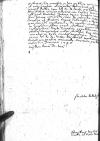 AAWO, AB, D. 19, No. 53_1
AAWO, AB, D. 19, No. 53_1
Reverendissime in Christo Pater et Domine, domine colendissime.
Officiosissimam servitutis meae commendationem et felicem anni huius ingressum, progressum feliciorem.
Quod litterae de ⌊Alexandro⌋ Reverendissimae Dominationis Vestrae nondum lectae sunt, id video perniciem ei esse allaturum. Nam si lectae fuissent, haberet iam ⌊Alexander⌋ salvum conductum, quem nondum obtentum esse questus est heri ⌊doctor Ioannes⌋. ⌊Nepos⌋ autem Reverendissimae Dominationis Vestrae ex ⌊Urbe⌋ miris modis obtestatur, ne salvus conductus ⌊ei⌋ detur, quod iam eo loci redactum esse dicit, ut sibi debitas poenas evolare non possit. Non aliam itaque ob causam eum salvum conductum petere, quam quod in magno se in ⌊Urbe⌋ discrimine esse videat. Vestra vero Reverendissima Dominatio in litteris suis, ut ⌊ei⌋ detur salvus conductus, assentiri videtur, quin et de recuperando sacerdotio spem ostendit. Mea quidem sententia satius erit silentio nunc haec praetermittere, ne coeptum in ⌊Urbe⌋ negotium impediatur.
De Scoto excusavit se dominus ⌊Soboczki⌋, quod non sua culpa factum sit, ut falsa sententia prodiret. Produxit coram ⌊reverendissimo⌋, quin et coram ⌊regia maiestate⌋, ut audio, decretum manu domini referendarii ⌊Uchanski⌋ subscriptum, quod se dicit obsignasse fidem eius secutum. A me postea postulavit, ut ego scriberem, quod in causa hac necessarium esse putarem. Quod ego ita, ut postulavit, feci, sed ea lege, ut maius ipse sigillum imprimeret. Mitto igitur Reverendissimae Dominationi aliud decretum vel mandatum potius, ut ipsa Torunensibus transmittat. ⌊Ioannes Czimmerman⌋ et ⌊Gotschalcus⌋, frater eius, obtinuerunt omnia, de quibus Reverendissima Dominatio Vestra scripsit.
Novarum rerum non multum est. ⌊Iustus Decius⌋
migravit ex hac vita. De Carolo Cutzer sumptum esse capitis supplicium, quod  AAWO, AB, D. 19, No. 53_2 is sororis suae maritum in via publica invaserit hidden by binding⌈[t]t hidden by binding⌉ et eum captum aliquamdiu detinuerit, est procul dubio iam ad Reverendissimam Dominationem Vestram perlatum. ⌊Serenissimi fratres⌋ annuas indutias cum ⌊caesare Turcarum hidden by binding⌈[um]um hidden by binding⌉⌋ esse pacti dicuntur. Interea tamen quattuor arces per ⌊Turcas⌋ occupatae sunt. De concordia inter ⌊Angliae et Franciae reges⌋ laboratur a ⌊caesare hidden by binding⌈[e]e hidden by binding⌉⌋ non sine spe conficiendae. De concilio eramus in magnam spem erecti, scribunt nonnulli refrigescere. ⌊Caesar Turcarum⌋ expeditionem contra ⌊Georgianos⌋ moliri scribitur. ⌊Rex iunior hidden by binding⌈[r]r hidden by binding⌉⌋ annatas in ⌊Urbe⌋ conatur impetrare.
AAWO, AB, D. 19, No. 53_2 is sororis suae maritum in via publica invaserit hidden by binding⌈[t]t hidden by binding⌉ et eum captum aliquamdiu detinuerit, est procul dubio iam ad Reverendissimam Dominationem Vestram perlatum. ⌊Serenissimi fratres⌋ annuas indutias cum ⌊caesare Turcarum hidden by binding⌈[um]um hidden by binding⌉⌋ esse pacti dicuntur. Interea tamen quattuor arces per ⌊Turcas⌋ occupatae sunt. De concordia inter ⌊Angliae et Franciae reges⌋ laboratur a ⌊caesare hidden by binding⌈[e]e hidden by binding⌉⌋ non sine spe conficiendae. De concilio eramus in magnam spem erecti, scribunt nonnulli refrigescere. ⌊Caesar Turcarum⌋ expeditionem contra ⌊Georgianos⌋ moliri scribitur. ⌊Rex iunior hidden by binding⌈[r]r hidden by binding⌉⌋ annatas in ⌊Urbe⌋ conatur impetrare.
Deum precor, ut Reverendissimam Dominationem Vestram diu servet incolumem. Cuius me gratiae commendo.
 AAWO, AB, D. 19, No. 53_2 is sororis suae maritum in via publica invaserit hidden by binding⌈[t]t hidden by binding⌉ et eum captum aliquamdiu detinuerit, est procul dubio iam ad Reverendissimam Dominationem Vestram perlatum.
AAWO, AB, D. 19, No. 53_2 is sororis suae maritum in via publica invaserit hidden by binding⌈[t]t hidden by binding⌉ et eum captum aliquamdiu detinuerit, est procul dubio iam ad Reverendissimam Dominationem Vestram perlatum. 

